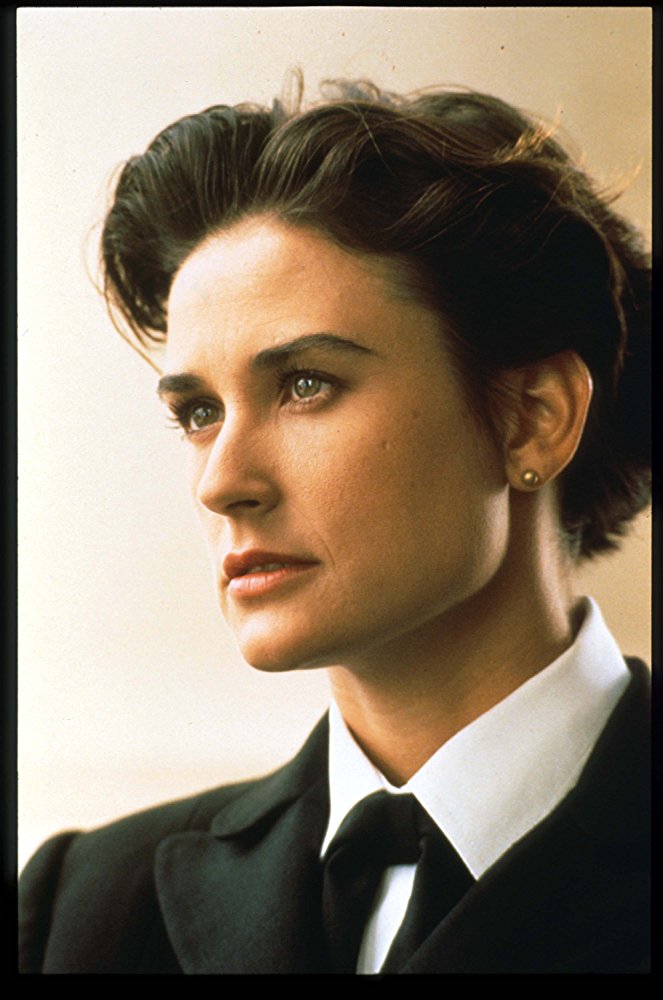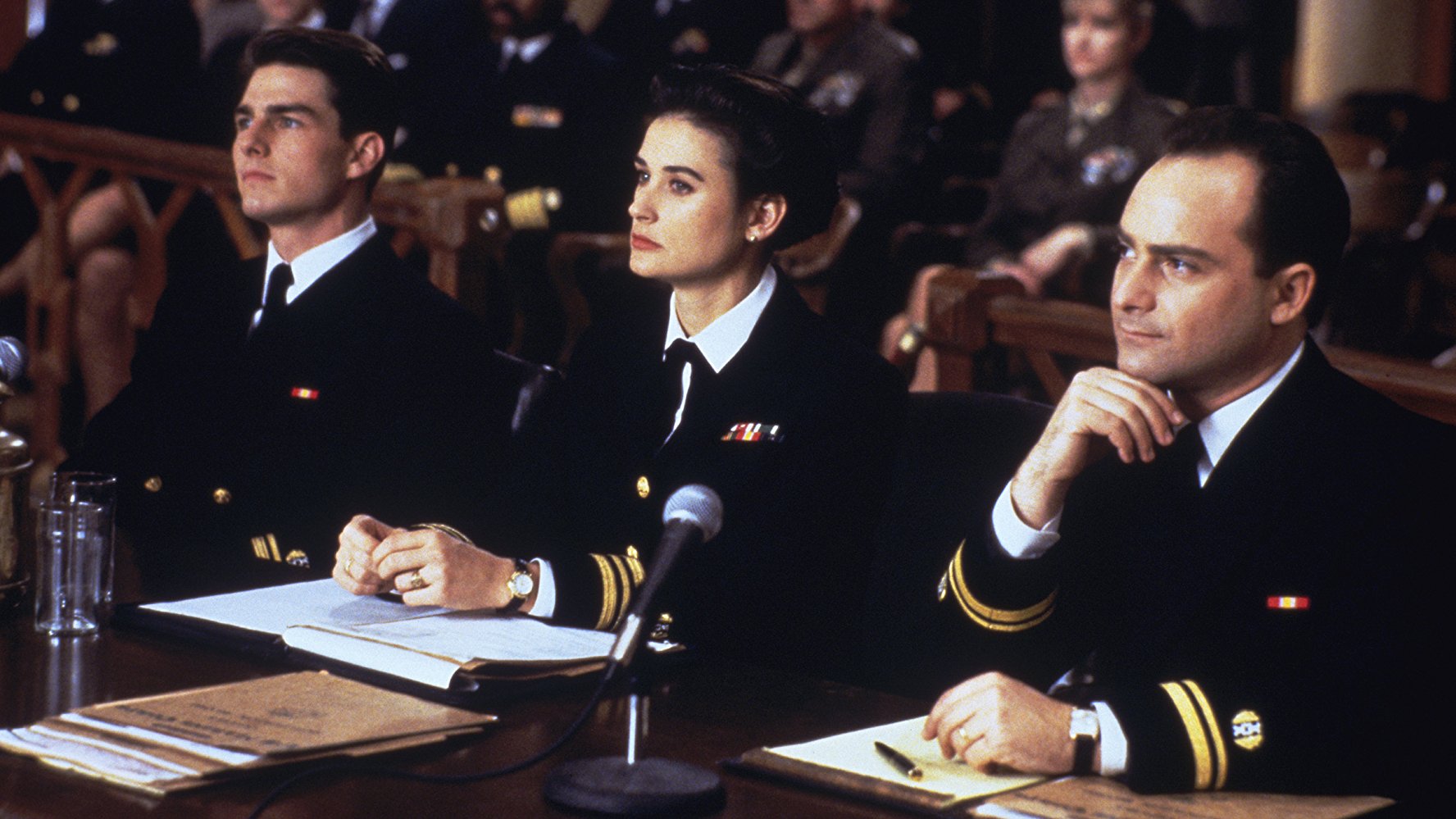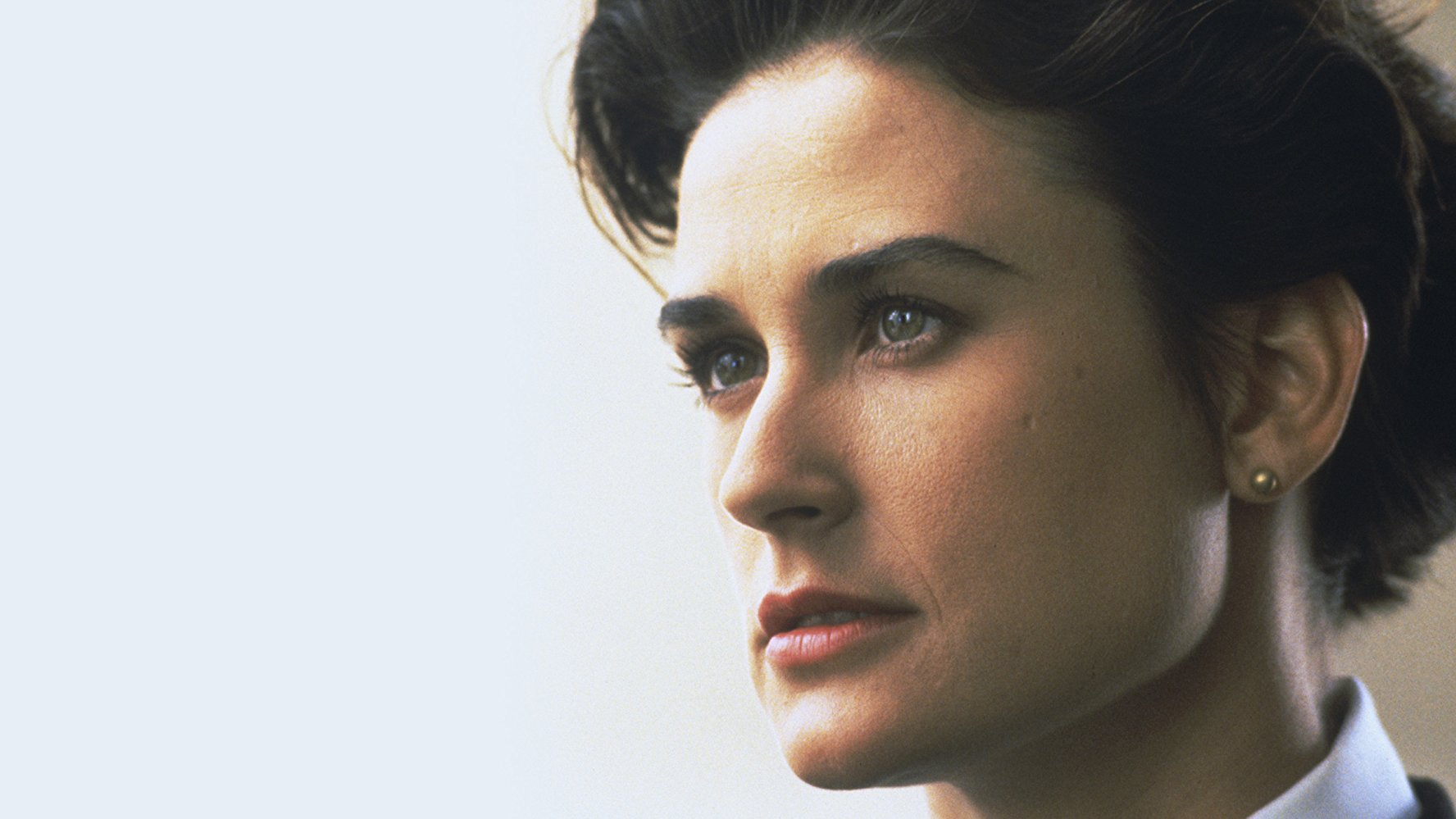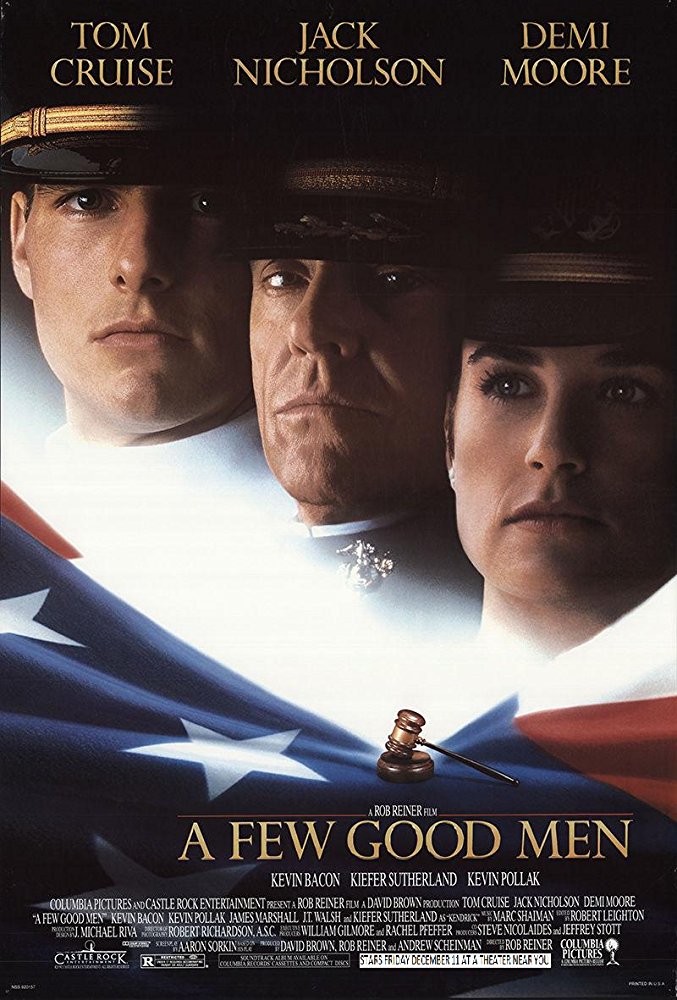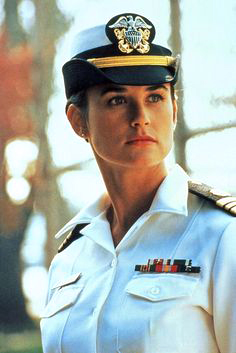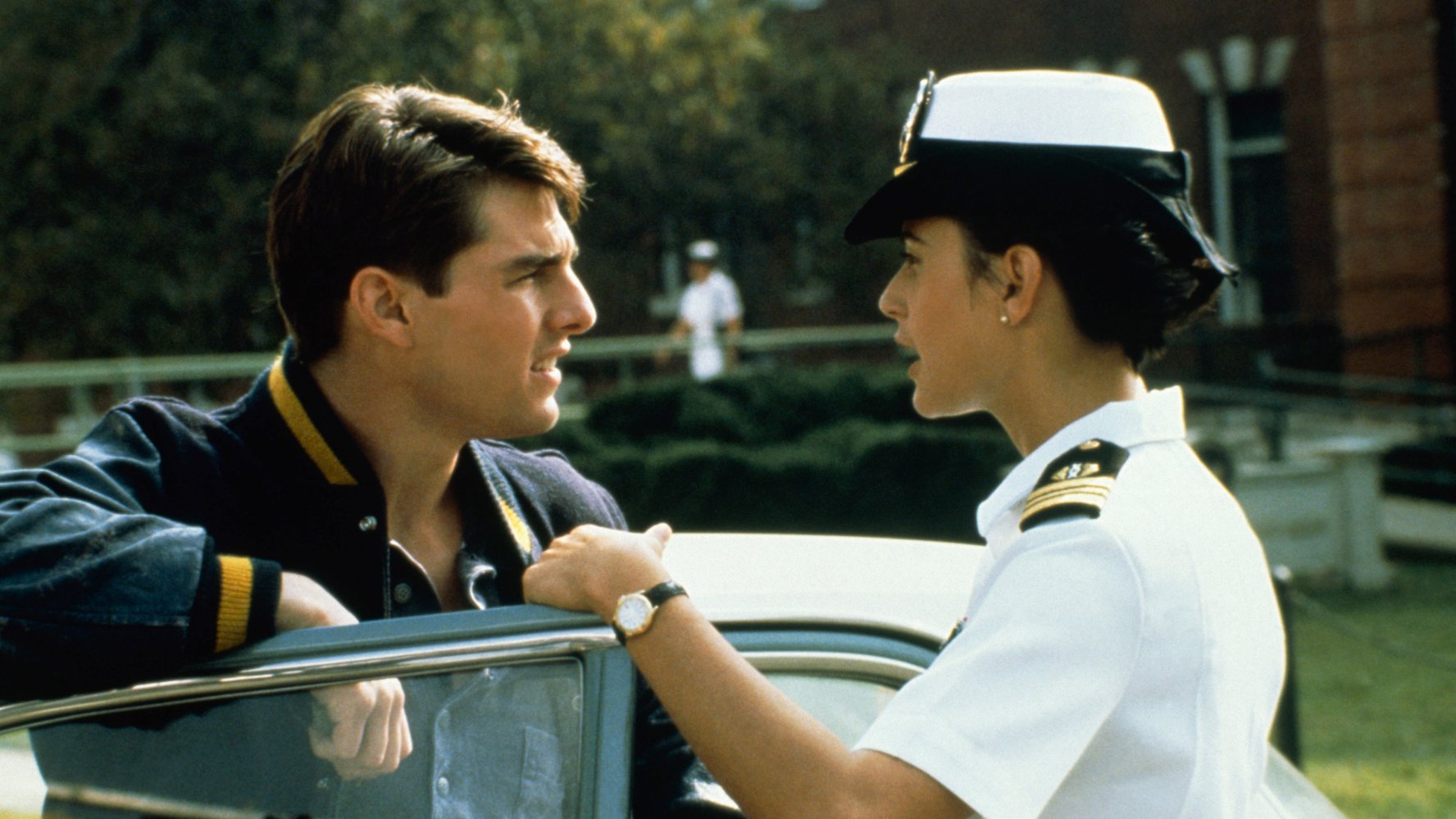LIEUTENANT-COMMANDER JOANNE GALLOWAY USN (Demi Moore), in A Few Good Men, was Special Counsel for Internal Affairs in the Naval Judge Advocate General's Corps, based at JAG HQ at the Washington Navy Yard. In 1990 a case landed in her lap that outraged her sensibilities--and caused her to question her own competence as a lawyer.The narrative says little of her background or when she joined the Navy. It does say this: she disposed of only three cases in her first two years in the JAG Corps. After that the Corps transferred her to Internal Affairs, where she earned a reputation as one of their finest investigators. But investigation is investigation, and trial work is trial work. Captain West, the commander of the Washington JAG Office, assessed her as all passion and no street smarts. On Monday 9 September 1991 the case of Lance Cpl. Harold Dawson USMC and Pfc. Louden Downey USMC landed on her desk. The external facts seemed simple enough: Dawson and Downey, at or before 2359 Friday 6 September 1991, in the barracks of Rifle Security Company Windward, Guantanamo Bay, Cuba, entered the barracks room of one Pfc. William T. Santiago, seized him, bound him hand and foot, and gagged him with an over-the-mouth stuffing gag. At 0037 Santiago was dead. Dawson and Downey now faced murder charges.Galloway was not satisfied. Dawson and Downey were recruiting-poster Marines. Santiago was a chronic screw-up. Unbidden the phrase came to her mind: Code Red. When enlisted men discipline one another, usually at the direction of non-coms.And so the afternoon of 9 September found her crossing the parade ground of the Yard, rehearsing the best way to ask Captain West that she be the attorney assigned to represent them.Captain West graciously agreed to see her. When she uttered the phrase Code Red in his presence, he invoked the Name of the reputed Lord and Savior of mankind. And when she requested that Dawson and Downey be moved to the Yard, and suggested that Division assign her as counsel, he asked, then ordered, her to leave his office.She waited outside for a minute, before Captain West summoned her back inside. He informed her that he would have Dawson and Downey moved to the Yard. But Division would assign another counsel. Your colleagues inform me, he said, that your talents would be wasted on what we're sure will be a four-day plea deal. When she sounded and alarm about a short-changed investigation, he said, Don't worry about it. In her experience, when a senior officer told her not to worry about a thing, she worried all the more.Especially when, later that day, she met the assigned lead counsel in the case of US v. Dawson and Downey: Lt. (jg) Daniel A. Kaffee USN. Nine months in the Navy, barely a year out of law school, and he successfully plea-bargained 44 cases, according to Lt. (jg) Sam Weinberg, the assigned co-counsel. So Division wouldn't even take her seriously.She did her best. She offered him fourteen letters Pfc. Santiago had written to various offices, including CINCLANT HQ and his U.S. Senator, asking for a transfer out of RFC Windward. Finally he had written to the Naval Investigative Service, offering information on an illegal fenceline shooting a month before--by Dawson. That letter made it look as though Dawson had a motive for murder. (Santiago and Downey were both members of the squad Dawson was assigned to lead.) Galloway further revealed the name of the Marine CO: Col. Nathan R. Jessup USMC, now about to be appointed Director of Operations for the National Security Council.The cocky Kaffee observed two things:1. The letters painted an unflattering picture of Marine life.2. Any protracted investigation might embarrass Col. Jessup.And he blithely announced Dawson and Downey would get a twelve-year sentence, max.He hadn't talked to a single witness, nor looked at a piece of paper, and he was that confident. She told him she expected him to go deeper than that. When he questioned her jurisdiction, she reminded him sharply she was Special Counsel for Internal Affairs. Which put her jurisdiction pretty much in his face. She assigned him some homework: read the letters, and submit a written report tomorrow (10 September).The next morning, she was furious to observe that Dawson and Downey were now confined to the brig here in Washington, while Kaffee was engaged in...softball practice! She told him she wanted to petition Division to assign different counsel, because he was unfit to conduct a proper defense! Kaffee tried to make stupid jokes: You don't even know me! Most people take hours to decide I am not fit to conduct a defense! You're wrong, she said. I do know you. She recited his background, what she had found out about it. The key: now he was laying low for the three years he had to serve in JAG, to satisfy his service obligation until he could get a real job. She then said, If you handle this case in the same fast-food, slick-***ed, Persian bazaar manner, with which you seem to handle everything else, you're going to miss something! She was used to getting sexual harassment from superior officers. She didn't expect to get it from this upstart. So she was unprepared when he said, Wow! I'm sexually aroused, Commander! She decided to ignore it. I don't think your clients murdered anyone, she said. She explained her reasoning: no intent. He repeated the medical evidence: pulmonary hemorrhage due to lactic acidosis, the nature of which suggested poisoning. She pointed out the most disturbing part of the timeline: at or about 0100 Santiago was dead. At 0300 the doctor had not determined a cause of death. Then at 0500 he came out with the poisoning theory. And had zero toxicological or other forensic evidence to support such a claim. Oh, now I see what you're saying! Kaffee said, derisively. It had to be Professor Plum in the library with the candlestick! I'm calling your supervisor, she said. That's all right, he said. Go straight up Pennsylvania Avenue; it's the big white house with the pillars in front. I don't think you'll have much luck, though. I was requested by Division, after all. Then she asked him, Do you know what a Code Red is? From the look in his face, he didn't.She was as good as her word. She tried to have him replaced as lead counsel. But there was no one in the JAG command, it seemed, whom he did not eat or drink or play sofball, basketball, or some other game with.But she was not idle, either, in contacting the families of the accused. She specifically contacted Virginia Ginny Miller, Downey's aunt andhis closest living relative. Aunt Ginny suggested she take Downey some comic books to read. When she met Downey, she understood at once why. This kid was out of it, and didn't even understand why he was under arrest. He was, quite simply, what the boys in her neighborhood would have called a retard. Since she knew she couldn't replace Kaffee, she would have to work with him. If you can't lick him, join him, the proverb said. So in the early afternoon she met Kaffee coming out fo the JAG administrative office and courthouse, and tried to offer him her friendship. It didn't go over very well. When she told of taking Downey the comic books, he said, Jo, if you ever speak to a client of mine gain without my permission, I'll have you disbarred. Friends? And when she said she got authorization from Aunt Ginny, he suggested they hold the trial in her barn! Finally, as he got into his car to drive away, she laid her hand lightly on the door--the window was down--and said, I'm going to Cuba with you tomorrow. She hadn't planned on it. But now she knew that would be imperative.The trip didn't help her impression of Kaffee any. He and Weinberg showed up wearing whites--she chose to wear khakis--and their escort, Cpl. Jeffrey Barnes, gave the men camouflage jackets to cover those bright white uniforms. When Barnes said they would need to travel by boat to cross the bay, Kaffee had a problem with that, saying he was none too crazy about boats! Now it was her turn to invoke the Name of the Lord and Savior of mankind, as she said, Kaffee, you're in the Navy, for crying out loud! But that was nothing compared to her visceral dislike-on-first-sight of the Gitmo Marine CO, Col. Jessup. He introduced his XO, Lt. Col. Matthew Andrew Markinson USMC, and the leader of Second Platoon Bravo, 1st Lt. Jonathan James Kendrick USMC. Lt. Kendrick toured them through Santiago's barracks room, during which Galloway asked Kaffee whether he was going tos tart investigating or just take the guided tour. At lunch (at Jessup's invitation), Jessup grated on her the more. So she challenged him about Code Reds still going on at Gitmo, in clear violation of a CINCLANT (Commander in Chief, Atlantic) directive. His first answer was to tell Kaffee how lucky he was to have a sexual partner, i.e. Galloway, who outranked him. And my only problem is, I'm a colonel, so I have to take cold showers until they elect some gal President, heh, heh, heh. Then he frostily said, On the record, I discourage the practice, in accordance with the CINCLANT directive. Off the record, I tell you I find Code Reds an invaluable part of close infantry training. So if it happens to go on without my knowledge, so be it. I run my unit how I run my unit. If you want to investigate me, roll the dice and take your chances. I eat breakfast three hundred yards away from four thousand Cubans who are trained to kill me. So don't think for one second that you can come down here, flash a badge, and make me nervous! That might have been a mistake. Because it seemed to awaken an instinct in Kaffee's mind. How did she know this? Well, before that outburst, Kaffee had been saying repeatedly, We're out of here and Col. Jessup doesn't have to answer that. Now all of a sudden, Kaffee was asking Jessup for a copy of Santiago's transfer order. He could ahve called any of a number of Pentagon officers for that transfer order. No. He wanted to see Jessup's reaction.Jessup did not disappoint: You gotta ask me nicely, he said in his habitual condescending tone. You see, Danny, I can deal with the bullets, the bombs, and the blood. I don't want medals, and I don't want money. What I do want is for you to stand there, in your faggotty white uniform, and with your Harvard mouth, extend me some f***ing courtesy! You have to ask me nicely! Kaffee asked him nicely, or at least made a decent show of it, which didn't seem too hard.The team hadn't been an hour back in the States before Galloway had word Markinson had gone UA from Gitmo. She went straight to Kaffee's off-the-Yard quarters to tell him. She told him, also, that she was now officially listed as Louden Downey's attorney-of-record. Downey had signed the papers for that, with Aunt Ginny as witness.Finally she laid before Kaffee her suspicion: Lt. Kendrick had ordered Dawson and Downey to do a Code Red on Santiago. She also suspected Kaffee thought the same.Kaffee didn't argue. Together they went to the stockade and challenged Dawson and Downey together with that question. And Dawson confirmed it.Kaffee was ticked off at Dawson for failing to mention that earlier. But he was even more ticked off at Captain Jack Ross USMC, the prosecuting officer on the case. With Galloway in tow, Kaffee went straight to the gym, called Jack out of a pick-up basketball game, and said, Jack! They were given an order! For once Smilin' Jack wiped his perpetual smirk off his face. (Galloway knew him by reputation, though the two never met before today.) Ross denied any knowledge of the order. Galloway thought he did know. And then Kaffee displayed his fast-food, slick-***ed Persian bazaar manners again: Jack didn't know about the order. Because if he did know, and didn't tell us, he would stand in violation of fourteen different parts of the Canon of Ethics. Jack's got enough problems without that. God forbid our clients should plead not guilty and testify under oath they were given an order! Galloway would, of course, have filed to indict him under those fourteen different sections of the Canon of Ethics. But Kaffee was a classic Persian bazaar used-car salesman. This was a negotiating ploy--an expert one, but still a ploy. It grated on Galloway's nerves.Even when Ross said, Jessup's star is on the rise, and Division will give me lots of room to keep this out of court, that did not mollify her. When Ross offered to knock the charge down to involuntary manslaughter, instead of first-degree murder, so Dawson and Downey would be home in six months, she said, No deal. We're going to court. Ross then said he would in that event charge Dawson and Downey with every charge that could possibly stick: first-degree murder, conspiracy to commit murder, and conduct unbecoming a United States Marine. That could put the two away for life.Kaffee, with Galloway still in tow, put the deal to Dawson and Downey. And Dawson refused. An outraged Kaffee first accused Galloway of putting Dawson up to the refusal, a thing Galloway would never have done. We have a code! Dawson insisted. Well, ZIPPITY-DOO-DAH! Kaffee roared back. You and your code plead not guilty, you will go to prison for the rest of your life. Do what I'm telling you, and you can go home. In six. Months. Do it, Harold! Six months! It's nothing! It's a hockey season! Dawson, after asking for and getting permission to speak, explained to Kaffee that he and Downey sought to live their lives by a certain code, a code they found as Marines, and they would never voluntarily sign a paper to say they had no honor. If a court decides I was wrong, said Dawson, I will accept whatever punishment the court directs. But I believe I was right. I believe I did my job. AND I WILL NOT DISHONOR MYSELF, MY UNIT, OR THE CORPS SO THAT I CAN GO HOME! IN SIX! MONTHS! SIR! Kaffee then asked to speak to Dawson alone, so Galloway asked the sergeant to conduct her and Downey to another holding room. Not long after that, a flushed Kaffee came back to say he was ready to leave. Back in Kaffee's office, he announced Dawson would go to jail just to spite him, and he wanted to get off the case. Weinberg said when the judge asked the defense to enter a plea, all Kaffee need do was request the assignment of different counsel. Galloway then said, Just one thing, Danny. When you ask the judge for different counsel, be sure and ask him nicely. An argument followed, during which time Kaffee demonstrated the crippling flaw that stopped him from being a winner: a totally pragmatic approach to the law, in which he would always negotiate, never fight. It doesn't matter what I believe! he cried. It only matters what I can prove! Don't tell me what I know and what I don't know! I know the law! In answer she told him what she thought of him, and what he looked like to her--or rather, how he was acting. Like a used-car salesman. An ambulance chaser with a rank. And the bitter truth was, she knew instinctively that he could be so much better than that.At the arraignment Kaffee surprised her completely. When the judge, Col. Julius Randolph USMC, asked the defense whether it was prepared to enter a plea, Lt. (jg) Kaffee did not say, Your Honor, I respectfully request the court assign different counsel. Instead he said, Yes. They're not guilty. The court entered the plea and scheduled the trial for 3 October.Galloway was too shocked to ask Kaffee what had happened to him overnight. For answer, he said, Why does a lieutenant (junior grade) with nine months' experience and a track record for plea bargaining get assigned a murder case? Could it be so it never sees the inside of a courtroom? In other words, he got it! His instincts had finally clicked!Kaffee issued rapid-fire orders to them. We'll work out of my apartment every night at seven o'clock, he said. He assigned Galloway to acquire a carton of legal pads, half a dozen boxes of red pens, and half a dozen boxes of black pens, and Weinberg to buy two desk lamps. We need to start a medical profile on Santiago, and Jo, I want all the Proficiency and Conduct Reports on Dawson, Downey, and Santiago, he went on. Then he asked everyone to bring whatever food they wanted to eat. Last of all he said, So this is what a courtroom looks like. He has told her, at that first meeting, he hadn't seen the inside of a courtroom, military or civilian, since he risks suspension of his driver's license on some moving violation or other.Galloway acquired the medical reports, the legal pads, the boxes of pens, and some Chinese food, and the team started to work. The defense amounted to three concepts:1. Intent: no proof of poisoning.2. Code Red: a common practice at Gitmo.3. The order: (A) Kendrick gave it, and (B) Dawson and Downey had no choice but to obey it.On the day before the trial began, Galloway turned to Kaffee one last time. To remind him to wear matching socks.Capt. Ross first called Agent Robert C. McGuire of NAS. Who testified to determining that Santiago had offered information on an illegal fenceline shooting on the night of 2 August, and that Lance Cpl. Dawson was the only one to turn in a weapon with a round of ammo expended. Kaffee expertly drew from McGuire he found no evidence to substantiate a charge of firing at the enemy without cause.Next Ross called a corporal to testify that Lt. Kendrick had called a meeting of the platoon to order them not to touch Santiago. Kaffee drew from that corporal that he wasn't in Dawson and Downey's barracks room twenty minutes later. When Ross was about to call everyone in the platoon, Kaffee expertly offered to concede that they all would testify as this first corporal had, if the government would concede none of them were in Dawson and Downey's room twenty minutes later. This was critical, because that's when Lt. Kendrick had ordered the Code Red. In private.The examination of Navy Commander Stone, the medical director of the Gitmo base hospital, proved problematic. Kaffee, of course, moved to suppress his evidence, saying, Commander Stone is an internist, not a criminologist. On cross-examination, Kaffee barely managed to suggest that Stone might have fudged the cause of death to cover up for his having returned a man to duty with a severe underlying cardiac condition, only to see that man later die.The problem: on redirect, Ross asked for Stone's expert opinion on whether Santiago had been poisoned, though no evidence of poison could be found. Galloway renewed the objection and asked the court to reconsider its earlier overruling. That caused the judge to yell at her, The witness is an expert, and the court will hear his opinion! After the adjournment, Lt. Weinberg rounded on Galloway about the difference between paper law and trial law. Kaffee told Weinberg not to relive the mistake.Then Galloway asked Weinberg, Why do you hate them so much? For answer he accused Dawson and Downey of torturing and tormenting a weaker kid to death, merely because they did not like him, and that inturn because he could not run very fast. Kaffee then ordered everyone to take the night off. On the way out, Weinberg asked Galloway, Why do you like them so much? Because, she said, they stand on a wall. And they say, 'Nothing's going to happen to you tonight, not on my watch.' That night she donned her civilian clothes, went to see Kaffee, and asked him out on a date--though she tried to deny it. (Yes, this was awkward.) They went out to a seafood place she knew--the kind of place where you ate lobster off a wooden table and they gave you a mallet to crack the lobster's parts open to get at the meat. She told Kaffee the history of her three cases in two years, and how she got transferred to Internal Affairs. Then she told him why she liked Kaffee so much: because he was an exceptional lawyer, and the court members liked him. But Kaffee was still doubtful. He expected to lose everything.Next Monday, though, he called Cpl. Barnes, their old escort. From him he drew a description of Code Reds, including one he'd gotten for dropping his weapon. And that no one ever gave Santiago a Code Red. Because Dawson wouldn't allow it. Ross forced Barnes to admit the expression Code Red did not appear in any book. But Kaffee quickly took the book and drew out that the book didn't show where the mess hall was, either. But every man knew where it was.That night, at the session where they were going to prepare to examine Lt. Kendrick as a hostile witness, Kaffee stunned them: Markinson had turned up! Kaffee had installed him in a hotel. Galloway used her clearance code to get Federal Marshals to guard Markinson. They also agreed they needed to get the tower chief's log at Gitmo--because Markinson had told them of a flight that had departed Gitmo at 2300 6 September, in contradistinction to the earlier statement by Jessup that the 0600 flight was the first flight out.The next day, Kaffee hammererd Kendrick, and hammered him hard. But he couldn't shake him, and couldn't make him confess to ordering a Code Red on Santiago. But he came close--very close. And Ross, on redirect, had to repeat the question to get a denial from Kendrick.That night, Weinberg came back with the tower chief's log. No flight! Kaffee went out to Markinson's hotel. When he came back, it was with the sobering realization that Jessup had doctored the tower chief's log, and also had had a friend of his doctor the tower chief's log at Andrews AFB (or Joint Base Andrews, as they call it today). Kaffee decided they didn't need the flight record; simply get Downey's testimony and proceed with that.And then disaster struck. Galloway prepped Downey to testify to having been given an order by Lt. Kendrick. But Ross drew out from Downey that he hadn't even been in the barracks room at the time. He never actually heard Lt. Kendrick give the Code Red order. The order had come from Lance Cpl. Dawson and only Lance Cpl. Dawson.Kaffee was late to their meeting. When he came back he was, quite simply, plastered. Embalmed. Pickled. Downey wasn't in his room, he said. He wasn't even there. That was an important piece of information, don't you think? And he had worse news: Markinson was dead. He had donned his Marine full-dress, stood in the middle of his hotel room, drawn the hickel-plated .45 from its holster, put the barrel into his mouth, and pulled the trigger.Galloway then suggested another gamble: ask Col. Randolph for a continuance, to subpoena Col. Jessup. The theory: Jessup had ordered Kendrick to order Dawson and Downey to do the Code Red. Kaffee became more agitated by the minute, and finally exploded, throwing papers and lamps off their work table. Galloway put on her coat and started out for her own quarters, trudging home in the rain. She had walked down that sidewalk, with totally inadequate head cover, for five minutes before she heard Kaffee calling to her: JoAnne! Jo! Get in the car! Will you please get in the car?!? Jo, I apologize! I was angry! I didn't mean what I said! I'M GOING TO PUT JESSUP ON THE STAND! And then she got into the car.Judge Randolph granted the continuance, and Kaffee issued the subpoena. Then he called Galloway and Weinberg together and, brimming with excitement, told them his theory: I think he wants to say it. I think he's p***ed off he has to hide from this. I think he wants to say he made a command decision, and that's the end of it. Then, in imitation of Jessup's patronizing tone, he said, He eats breakfast three hundred yards away from four thousand Cubans who are trained to kill him! And nobody's gonna tell him how to run his unit, least of all the Harvard Mouth in the Faggotty White Uniform. I need to shake him, put him on the defensive, and lead him right where he's dying to go. And how was he going to do that? After he went into his closet to retrieve his softball bat, he abruptly said he was going to the office. Then he called the apartment and left a message for Sam: drive out to Andrews, talk to two members of the ground crew, and have them come in, prepared to testify.The day came. And Galloway, in trepidation, asked Kaffee to think hard about what he was about to do. For if he accused Jessup without evidence, he could get into a lot of trouble. As she knew only too well.Kaffee called Jessup. He first introduced a clear discrepancy. You [Jessup] were leaving for one day. You packed a bag and made three phone calls. Santiago. Was leaving. For the rest of his. Life. And he hadn't called a soul. And he hadn't packed a thing. Why? Galloway watched as Kaffee, starting with that, then goaded Jessup to demonstrating a subtle, but noticeable, contempt for any authority but his own. Including that of the court.Then Kaffee got to the point: why two orders? If you gave an order that Santiago wasn't to be touch, he asked, and your orders are always obeyed, then ahy did Santiago need to be transferred? Then in rapid-fire order he made his suggest: Kendrick had ordered a Code Red, at Jessup's order. And when it had gone sour, Jessup had cut Dawson and Downey loose. Ross and Randolph both shouted at Kaffee to stop, but Kaffee was clearly on a roll. Last of all he shouted, COLONEL JESSUP! DID! YOU! ORDER! THE CODE RED?!? You don't have to answer that question! cried the judge.But Jessup did answer.After justifying himself, in that same annoying, grating, patronizing manner of his, he answered: YOU'RE G_D-D____D RIGHT I DID! What happened next was breathtaking. The court dismissed its members and held an Article 39A session. To Mirandize and arrest Jessup. Jessup lunged at Kaffee and screamed out the disgusting way he wanted to kill him, so that the MPs had to restrain him physically. Then he let the MPs take him away.Finally the verdict came in:On the murder charge: not guilty.On the conspiracy charge: not guilty.On the conduct-unbecoming charge: guilty as charged.Sentence: Time already served and dishonorable discharge.Downey was upset. He turned to Galloway, saying, Col. Jessup said he ordered the Code Red. I know, Galloway said. But... Colonel Jessup said he ordered the Code Red. What did we do wrong? It's not that simple... HE ORDERED THE CODE RED! WHAT DID WE DO WRONG? WE DID NOTHING WRONG! Yeah, we did, said Dawson. We were supposed to fight for those who couldn't fight for themselves. We were supposed to fight for Willie. Galloway was too overcome to say any more. But it registered with her when Kaffee assured Dawson he didn't need a patch on his shoulder to have honor--and Dawson gave Kaffee a sincerely heartfelt salute.Galloway left the courtroom. She knew without asking that this is what had really worried Kaffee from the beginning: Dawson and Downey should never have blindly followed an order that was violative of the Marine Code of Conduct, not to mention a CINCLANT directive.Whether the two continued their relationship, professional or personal, the narrative does not say.
Show less «

